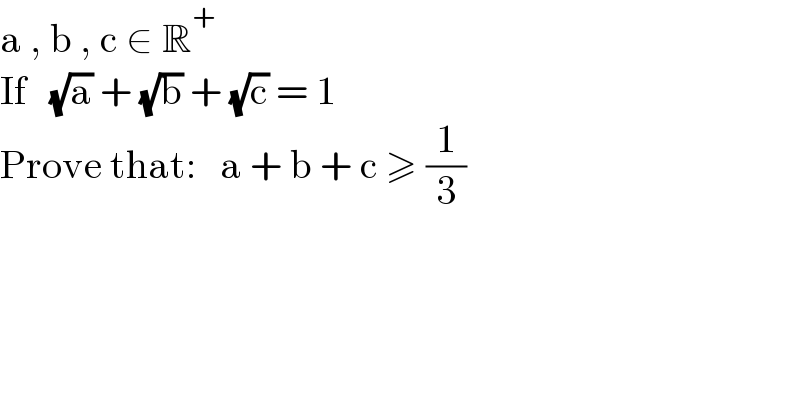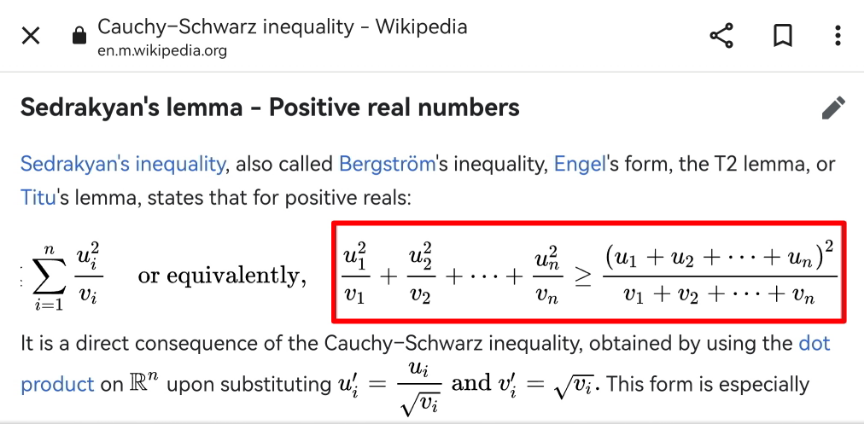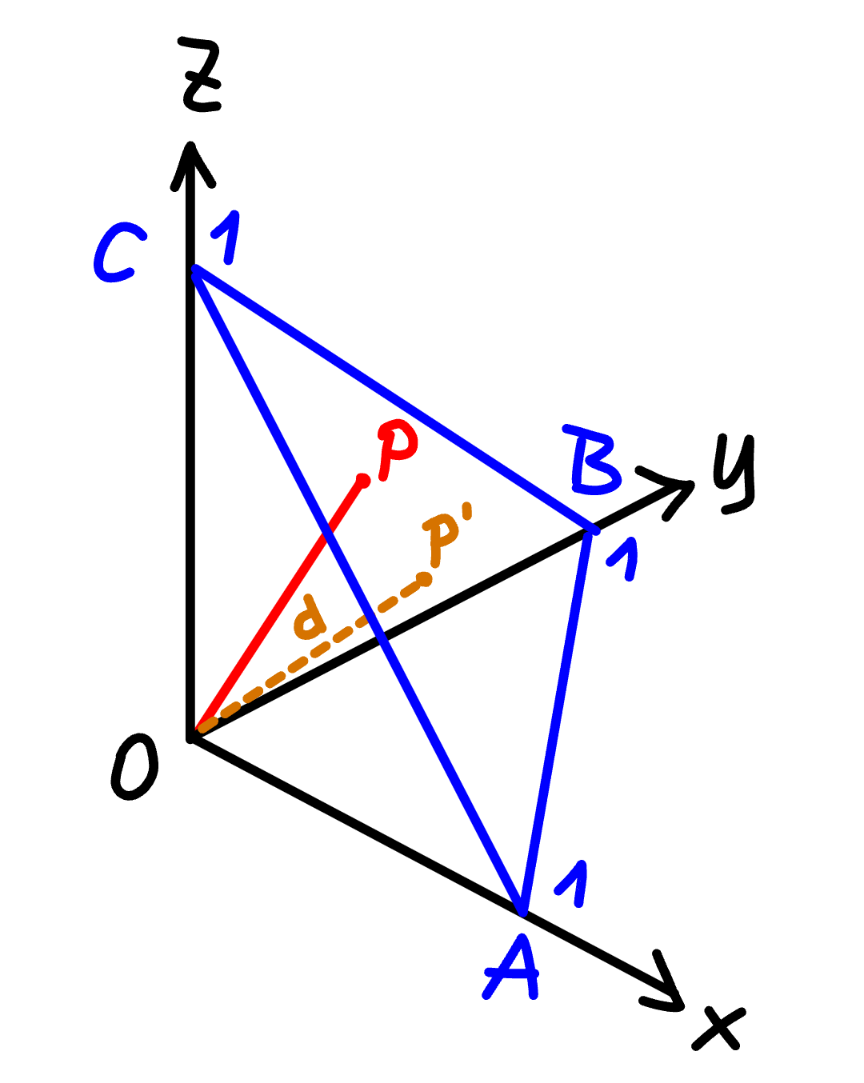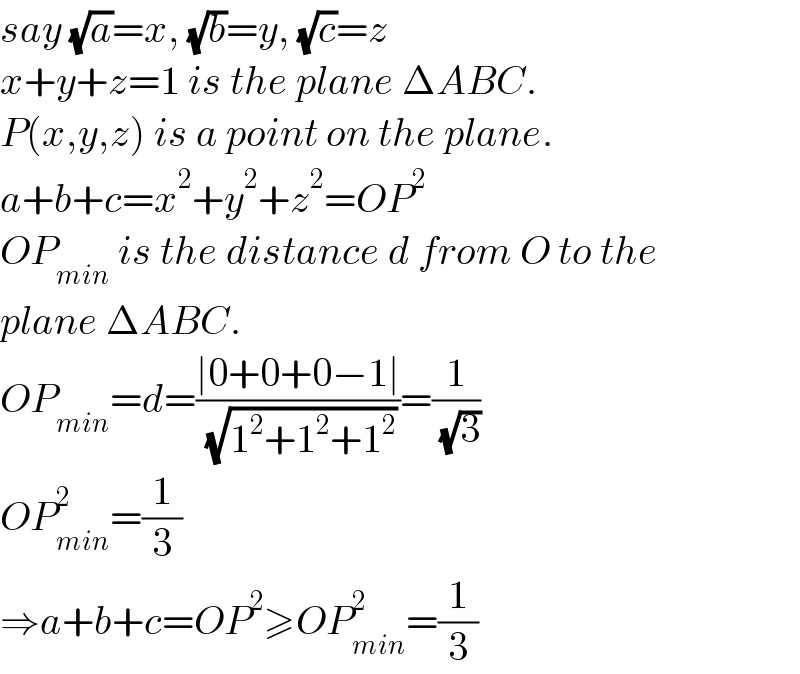
Question Number 204621 by hardmath last updated on 23/Feb/24

$$\mathrm{a}\:,\:\mathrm{b}\:,\:\mathrm{c}\:\in\:\mathbb{R}^{+} \\ $$$$\mathrm{If}\:\:\:\sqrt{\mathrm{a}}\:+\:\sqrt{\mathrm{b}}\:+\:\sqrt{\mathrm{c}}\:=\:\mathrm{1} \\ $$$$\mathrm{Prove}\:\mathrm{that}:\:\:\:\mathrm{a}\:+\:\mathrm{b}\:+\:\mathrm{c}\:\geqslant\:\frac{\mathrm{1}}{\mathrm{3}} \\ $$
Answered by A5T last updated on 23/Feb/24

$$\frac{{a}+{b}+{c}}{\mathrm{3}}\geqslant\left(\frac{\sqrt{{a}}+\sqrt{{b}}+\sqrt{{c}}}{\mathrm{3}}\right)^{\mathrm{2}} =\frac{\mathrm{1}}{\mathrm{9}}\Rightarrow{a}+{b}+{c}\geqslant\frac{\mathrm{1}}{\mathrm{3}} \\ $$
Answered by mr W last updated on 23/Feb/24

$${a}+{b}+{c}=\frac{\left(\sqrt{{a}}\right)^{\mathrm{2}} }{\mathrm{1}}+\frac{\left(\sqrt{{b}}\right)^{\mathrm{2}} }{\mathrm{1}}+\frac{\left(\sqrt{{c}}\right)^{\mathrm{2}} }{\mathrm{1}} \\ $$$$\:\:\:\:\:\:\:\:\:\:\:\:\:\:\:\geqslant\frac{\left(\sqrt{{a}}+\sqrt{{b}}+\sqrt{{c}}\right)^{\mathrm{2}} }{\mathrm{1}+\mathrm{1}+\mathrm{1}}=\frac{\mathrm{1}^{\mathrm{2}} }{\mathrm{3}}=\frac{\mathrm{1}}{\mathrm{3}} \\ $$
Commented by mr W last updated on 23/Feb/24

Answered by mr W last updated on 24/Feb/24

Commented by mr W last updated on 24/Feb/24

$${say}\:\sqrt{{a}}={x},\:\sqrt{{b}}={y},\:\sqrt{{c}}={z} \\ $$$${x}+{y}+{z}=\mathrm{1}\:{is}\:{the}\:{plane}\:\Delta{ABC}. \\ $$$${P}\left({x},{y},{z}\right)\:{is}\:{a}\:{point}\:{on}\:{the}\:{plane}. \\ $$$${a}+{b}+{c}={x}^{\mathrm{2}} +{y}^{\mathrm{2}} +{z}^{\mathrm{2}} ={OP}^{\mathrm{2}} \\ $$$${OP}_{{min}} \:{is}\:{the}\:{distance}\:{d}\:{from}\:{O}\:{to}\:{the} \\ $$$${plane}\:\Delta{ABC}. \\ $$$${OP}_{{min}} ={d}=\frac{\mid\mathrm{0}+\mathrm{0}+\mathrm{0}−\mathrm{1}\mid}{\:\sqrt{\mathrm{1}^{\mathrm{2}} +\mathrm{1}^{\mathrm{2}} +\mathrm{1}^{\mathrm{2}} }}=\frac{\mathrm{1}}{\:\sqrt{\mathrm{3}}} \\ $$$${OP}_{{min}} ^{\mathrm{2}} =\frac{\mathrm{1}}{\mathrm{3}} \\ $$$$\Rightarrow{a}+{b}+{c}={OP}^{\mathrm{2}} \geqslant{OP}_{{min}} ^{\mathrm{2}} =\frac{\mathrm{1}}{\mathrm{3}} \\ $$
Commented by hardmath last updated on 24/Feb/24

$$\mathrm{Perfect}\:\mathrm{solution},\:\mathrm{thank}\:\mathrm{you}\:\mathrm{dear}\:\mathrm{professor} \\ $$
